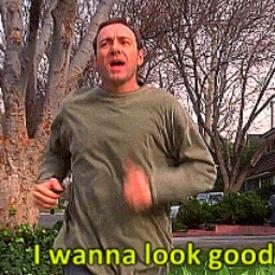Question for you fellas about lifting for teen boys
Replies
-
my sons 16 and has started to show an interest, he hasn't got any weight to lose, is 5'10 and has very broad shoulders already. too much to read now but bumping for later.
if you are concerned for stunted growth, i wander if enough protein has anything to do with it? (just a shot in the dark)
The stunted growth thing used to be "General Wisdom" from the 80's and turned out to be not well supported with studies. I suspect part of it came from having a lot of short muscle-men. My theory on that is that shorter men are more likely to do extra training (weights, martial arts) and the appearance of a "lot of body builders are short" carried over to "body building makes you short" stuff. As someone pointed out, look at an NFL game those guys didn't start lifting in college. 0
those guys didn't start lifting in college. 0 -
Let him lift.... It does not stunt your growth. My older son started at 13 he was 5'10 and 120. He will be 16 in June and is 6'3" 185 and still growing. I wanted him to lear the correct way so I showed him and got him a trainer once a week for $35 an hour. This is key as he was starting to lift in High school the next year and they had minimal supervision.
It is important that he learns the correct form. even if he just uses the bar with no weights to start with and then gradually increase the weights. The increase in muscle will come in time. It may even benifit to get him a trainer once a week to teach him the proper form. Go with basic movements. Bench press, dead lift, squats... no need to get into isolating specific muscle groups for some time yet. If you have dumbells that is a good and safer start.
Most injuries happen when the person is lifting too much or uses the incorrect form...0 -
weight lifting in young teens CAN stunt growth if the growth plate is damaged...
I would have him train at a local school gym with one of the coaches who will monitor his weight load and the amts that are increased..
correction it can affect the natural growth ^0 -
He should be ok, if he uses light weight for now. I wouldn't start lifting more until he's 15 and then heavy until, at least 17. He should learn the proper technique. Two or three times a week is all he would need.0
-
it is ok if he lifts light to medium reps, lots of reps... but don't let him left heavy0
-
No, I would not worry. Our high school offers weight training for different athletics. Just do a little research about how to increase weights safely for his age. Good luck!0
-
He shouldn't be doing anything other then body weight exercises, he could do things like p90x and the like, you could get him a trx (http://www.trxtraining.com/) or just tell him to do sit ups, squats, lunges, and pushups.
lifting weights when your still growing is asking for problems down the road.
disclaimer: i'm not a doctor, or even a personal trainer, but i have taken the Canadian coaches courses(NCCP) all the way up to level 3. and along the way this has come up many times.0 -
I would strongly suggest a personal trainer or some else who is qualified to show him how to do it correctly.
Stunt his growth???? At 6 feet tall, how much taller does he really want to get?
I started weight lifting at home when I was 10 years old. I am 5'11" (just taller than my father) and am very happy I started early.
My single biggest concern is that he could injure himself (especially his back) if he isn't properly educated in lifting techniques and proper body balance.
If he learns how to do proper and balanced lifting he will be just fine!0 -
weight lifting in young teens CAN stunt growth if the growth plate is damaged...
I would have him train at a local school gym with one of the coaches who will monitor his weight load and the amts that are increased..
correction it can affect the natural growth ^
Anything that damages a growth plate can stunt their growth. Like breaking an arm. There is a higher risk of a kid falling off their bike and breaking the arm and damaging the growth plate then there is from them lifting weights.0 -
Go light and focus on form.0
-
There is nothing wrong with lifting weights. But if you are still not sure about it he can always do body weights. Try to get him to build up to 100 pushups and he will feel like a boss.
I know when I was in middle school and the beginning of high school I care about how many pushups and chin ups I could do because I wanted to do more than my team mates.
If you do let him lift weights, please make sure he is taught the correct form and is supervised by someone who knows something about lifting weights. Form is way more important than how much weight one can do. I wish I wouldn't been taught this at a younger age.0 -
If you want guidance on this subject, I would go to the position statements issued by the appropriate professional groups.
The National Strength and Conditioning Association, The American College of Sports Medicine, and the American Academy of Pediatrics are all in agreement that weight lifting (strength training, resistance training) is safe and effective for adolescents, according to the following guidelines:
1. Avoid maximal lifts.
2. Avoid heavy overhead lifting.
3. The younger the exerciser, the more emphasis there should be on proper lifting form and training techniques. Body weight exercises are often the best choice, but resistance machines, free weights, bands, cables, etc can all be effective as well.
4. All workouts should initially be supervised by adults who are trained in or knowledgeable about proper lifting form and appropriate training guidelines for adolescents.
5. Younger exercisers should not be allowed to engage in "lifting contents" with friends or teammates. They should also not be pushed if they show signs of excessive fatigue, poor coordination, or disinterest. That's a big cause of injuries.
6. Expectations should be realistic. A teen does not produce the hormones necessary to achieve large amounts of muscle growth. They can significantly increase muscle strength, but substantially increasing muscle size requires a more mature body.
The generalized fears expressed by some about physical or development damage caused by weight lifting in adolescence has been shown to be unfounded--if guidelines are followed. Weight training per se will not stunt growth or lead to epiphyseal fractures. The younger or less experienced the exerciser, the more emphasis there should be on functional and balance movements in order to teach greater coordination and kinesthetic awareness.0
This discussion has been closed.
Categories
- All Categories
- 1.4M Health, Wellness and Goals
- 397K Introduce Yourself
- 44.2K Getting Started
- 260.9K Health and Weight Loss
- 176.3K Food and Nutrition
- 47.6K Recipes
- 232.8K Fitness and Exercise
- 456 Sleep, Mindfulness and Overall Wellness
- 6.5K Goal: Maintaining Weight
- 8.7K Goal: Gaining Weight and Body Building
- 153.3K Motivation and Support
- 8.3K Challenges
- 1.3K Debate Club
- 96.5K Chit-Chat
- 2.6K Fun and Games
- 4.6K MyFitnessPal Information
- 16 News and Announcements
- 18 MyFitnessPal Academy
- 1.4K Feature Suggestions and Ideas
- 3.1K MyFitnessPal Tech Support Questions










